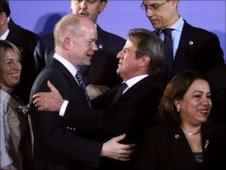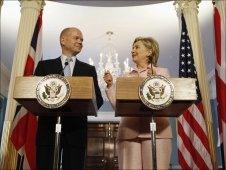Realities facing UK foreign policy
- Published

Mr Hague wants to take an active role with his EU colleagues
The 'distinctly British' foreign policy promised by the new Foreign Secretary William Hague will have to overcome some of the realities of the world if it is to be successful.
It seeks to be so many things at once.
The UK, Mr Hague suggests, should be a loyal but not slavish friend of the US, an active but not abject member of the European Union and an enthusiastic networker in the wider world.
He says he wants the UK to reach out beyond the EU to emerging nations in Asia, Latin America and the Middle East (and is doing it via Twitter with the foreign minister of Bahrain already).
I have seen other British governments doing this before, if not on Twitter.
John Major went to India and China with similar ideas. Even Mrs Thatcher was persuaded once to go on a long trip, ending up in Australia, to show how interested she was in forging links with up-and-coming nations.
But the reality is that most governments around the world, while quite happy to be friends with the UK (and anyone else), listen to London only if it is a close partner of the United States or as part of the EU, and is in any event economically strong.
'Active' role
In a similar speech during the election campaign, Mr Hague said he accepted that Britain was falling down the ranks of the top economic powers. His answer was not that it should adjust to a more modest role but that it should redouble its diplomatic efforts.
But take Afghanistan. The UK is only there because the US is. While Britain has a voice, it is not a determining voice and not a "distinctive" one either.
Or Iran. Britain is part of a three-nation EU negotiating team over Iran's nuclear activities and this threesome is joined by the US, Russia and China.
There is no place for a "distinctly British" view anymore than there is for a French or German view. They matter only if they speak as one.

The UK's relationship with the US is key
Mr Hague has certainly pleased his European partners by promising not to have rows and this has been made easier because, post the Lisbon treaty, there is no immediate constitutional debate and therefore a truce.
He also wants to be "active" in Europe and this will be no problem.
EU foreign policy is run along lines thoroughly approved of by the UK. It depends on consensus and nobody is forced to act against their will. All British (and other) foreign secretaries rather like going to the monthly meeting of foreign ministers and are pleased that their opinion does count there.
As for his idea that more Britons should join the European Commission to give "due weight to the exercise of British influence in the EU," this runs into a particular problem.
European civil servants are not allowed to further their own country's national interests.
Indeed, my experience of the European Commission when I was based in Brussels (admittedly way back in the mid-1980s) was that the Brits there often turned distinctly anti-British and pro-European. Be careful what you wish for.
One of the most significant parts of his thinking is the formation of an American-style National Security Council (NSC).
This has already been set up, under the chair of a Foreign Office diplomat Sir Peter Ricketts. Typically, the Foreign Office has grabbed this post for itself. So part of Mr Hague's talk about re-invigorating the Foreign Office smacks of institutional preening. The US NSC is led by one of the president's men, not the State Department.
The idea is to avoid fragmented foreign and security policy-making. This is an implied criticism of the informal way in which policy was framed leading up to the invasion of Iraq.
So the concept is there and the mechanisms are in place. We await the results.
- Published1 July 2010